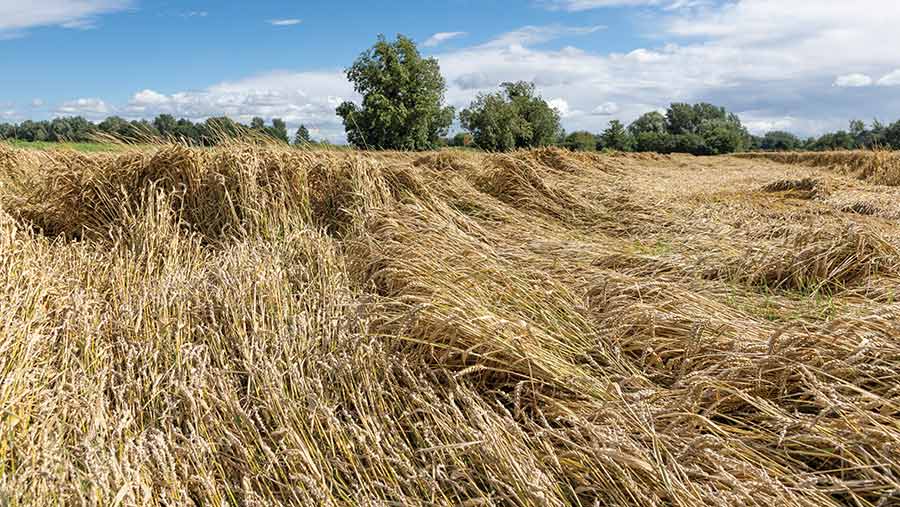Lingering uncertainty dents farmer confidence, FW survey finds
 Lodged winter wheat © GNP
Lodged winter wheat © GNP Massive uncertainty about the high cost of farm inputs, the sliding value of outputs and future government support for agriculture continue to seriously dent farmer confidence – as has the disappearance of summer.
For the third consecutive year, for our ongoing Transition project, we have tested the waters of farmer opinion with a major, UK-wide industry survey.
The demise of the Basic Payment Scheme (BPS), which is well under way in England, was a primary concern for many of the 500-plus farmers polled.
See also: Transition survey reveals depth of concern over policy and costs
Although the UK government has promised to ring-fence current funding for the remainder of this parliament, and it has already started reallocating funds accrued from BPS cuts in England through various grant and environmental schemes, farmers are fearful about their viability.
There are also no guarantees about the budget post-2024.
Almost half of those surveyed (49%) said they were “very concerned” about how they will replace lost revenue from BPS cuts, compared with 45% a year ago.
And over half (55%) felt it would be difficult to survive without BPS support.
Some are already taking action to adjust to the new challenges, such as stepping up production, diversifying and cutting back on labour and machinery.
There is also an interest in engaging with environmental schemes to recoup lost money.
But a notable change since last year’s survey is the declining interest in the Sustainable Farming Incentive (SFI).
In 2021, 67% of English farmers said they would be interested in joining, but by this spring that figure had fallen to just 49% – reflecting farmer frustration at low payments and inadequate information.
At the time of the survey (in April), only 12% of UK farmers felt they had enough guidance on future farming policy.
Since then, farmers in England have received more detail about SFI, with the publication of the new standards for 2023, including payment rates, but the Defra decision to terminate existing 2022 agreements has undermined confidence.
Overall, levels of discontent with the government’s farm strategy have risen steadily from 72% in 2021 to 81% last year, and 87% in April 2023.
Cumbria-based Transition Farmer Vaughan Hodgson blamed the complexity he has encountered with the various government grant schemes.
Many practicing farmers do not have the time or capacity to get their heads around it, he said.
Costly harvest
Adding to the sector’s woes, NFU vice-president David Exwood said harvest was looking “pretty desperate” for many farmers with variable yields, low quality, high drying costs and mediocre prices.
“When you set that against big drops in the milk prices since the start of the year, beef prices on the slide as well, lamb’s a bit flakey, there’s lots of uncertainty on the back of this really exceptionally expensive year,” he added.
Mr Exwood said farmers in England welcomed receiving advance BPS payments this month, but lower payment rates were starting to hit home.
Defra’s 2023 SFI scheme is set to open for applications from eligible farmers in England at the end of August.
Mr Exwood said it was vital the rollout goes smoothly, adding: “It matters that the money can get out to farmers to replace their lost BPS.”
A Defra spokesperson said: “Listening to farmers is a crucial part of our role and is how we shape our future farming policy.
“Through our environmental land management schemes, such as the Sustainable Farming Incentive, we will pay farmers to adopt and maintain sustainable farming practices that can protect and enhance the natural environment alongside food production, and support farm productivity.
“But we’re not complacent, and we know that there’s still work to do to ensure that our schemes work for farm businesses, food production and the natural environment.”
Farm vets lobby MPs for more support for dairy farmers
Farm vets from one of Europe’s largest veterinary groups have written to their MPs to ask the UK government for greater support for dairy farmers following drastic cuts to milk prices.
In the letter, vets from VetPartners, which owns 52 farm and mixed practice surgeries, call for a minimum farmgate price to be implemented to ensure a fair deal for primary producers.
The letter was originally drafted by Westpoint Farm Vets.
Their intervention comes as Farmers Weekly understands the NFU’s upcoming dairy intentions survey will show an increase in the number of producers preparing to exit the industry.
The average farmgate price for milk slipped to 37.6p/litre in May, according to government data – a near-8% decrease on the same month a year earlier – leading to many farmers leaving the sector.
An AHDB survey in April suggested there are now only 7,500 dairy producers in Great Britain, down 4.8% on the previous year (7,880).
VetPartners farm director Ian Cure said: “We have already seen many farmers leave the sector for economic reasons.
“Food security for this island nation is paramount, and I believe we must take action now to prevent more farmers leaving the industry.”
